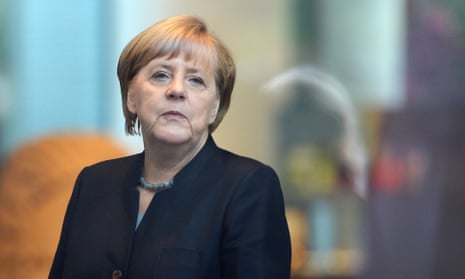Angela Merkel has significantly stiffened her rhetoric on Brexit, telling an audience of German business leaders that any exception to the EU’s single market rules would represent “a systemic challenge for the entire European Union”.
The German chancellor’s remarks reflect an apparent toughening of positions in European capitals after Theresa May announced on Sunday that the UK would begin formal divorce talks by the end of March and indicated it was heading for a “hard Brexit”.
Merkel appealed to German firms to show a united front with EU governments in negotiations over Britain’s departure from the bloc, urging them to support the principle of “full access to the single market only in exchange for signing up to the four freedoms”.
If any one country was allowed an exception, she said, “you can imagine how all countries will put put conditions on free movement with other countries. And that would create an extremely difficult situation.”
The applause for Merkel’s comments put a further question mark over the argument of British pro-Brexit politicians that German businesses will inevitably pressure their government to preserve their trade links with the UK and resist tariffs.
Markus Kerber, the leader of Germany’s largest industry group, said last week that trade, investments and single market solidarity with the rest of the EU were more important than the volume of business German companies do with Britain.
Joseph Muscat, the prime minister of Malta, which will hold the EU’s rotating presidency when Britain triggers article 50 of the Lisbon treaty to launch the two-year exit process, told the Guardian that May had made it plain “controlling immigration will be her number one priority”.
That made her subsequent statement that she also wanted British business to have the maximum opportunity to operate within the single market “problematic, to say the least,” he said.
The four freedoms – free movement of goods, capital, services, and people – could not be decoupled, Muscat said. “That cannot be negotiated … These principles are the basis for everything the EU does.”
Brexit was “not just an accounting exercise” for the EU 27, he said, adding that Britain’s deal had to be be “fair, but it has to be inferior. The idea that Britain can come back with a superior deal, or even the same deal, is not acceptable.
“Of course, if your priority is controlling immigration, it may not be a worse deal. But it must be inferior in terms of the whole package. There can be no membership with caveats.”
He said his impression from contact with UK officials was that Britain aimed to negotiate “by chapters – sovereignty, the single market, freedom of movement”. There was resistance to that, he said. “The other members want to see these addressed together.”
The tone of Merkel’s remarks in particular stands in sharp contrast to the conciliatory language coming out of Berlin in the immediate aftermath of the referendum, when leading politicians pleaded for London to be given more time to think through the consequences of the vote.
Jens Spahn, a senior member of her Christian Democrat Union party, confirmed the tough line, including no pre-negotiations before article 50 is triggered.
“We cannot grant any special treatment even before negotiations. Then we would have 27 special agreements tomorrow. Then there won’t be a European Union any more,” he said. “We have to negotiate really hard, we have to remain tough.”
The EU 27 would take four or five weeks to confirm a common position on Brexit once Britain had triggered article 50, Muscat said, after which day-to-day talks would be handled by the European commission’s chief negotiator, Michel Barnier, and his German deputy, Sabine Weyand.

Comments (…)
Sign in or create your Guardian account to join the discussion